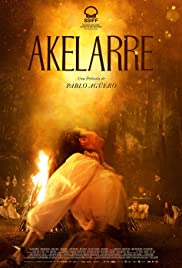
AKELARRE/COVEN
Spain, 2020, 92 minutes, Colour.
Amaia Aberasturi, Alex Brendemühl, Daniel Fanego
Directed by Pablo Aguero.
Spain, 1609. Basque country, the Inquisition. (The comparison might be made with James I and his preoccupation with witches in England at the same time.)
The film opens with flames and witches being burnt alive. The Inquisitor is travelling around with the secretary and a surgeon, searching for witches, noting that 77 have been burnt, and high suspicions about the Witches Sabbath and the summoning of the devil, dancing and incantations in the woods, black masses…
In a village near the sea, where men are absent because they are sailors, we see six young women, happy in each other’s company, out in the woods and on the cliffs. They become the target of the Inquisitor, each being violently arrested, questioned, eventually tortured. They are bewildered. Inexperienced. At the interrogations, with the secretary continually taking notes, the Inquisitor is able to play with words and play with logic, tangling the young women in their responses, making them convicted themselves by their own words or by their silences.
The Inquisition trio stay at a local Inn, very demanding during meal sequence, discussing their ambitions to search out the witches and discover the truth about the Sabbaths.
The drama in the film is highlighted by one of the women, Ana, who is very shrewd, advises the young women, some of whom have been brutally tortured, head shaven, to delay until the sailors return in the following week at the full moon. During her interrogations, she is particularly shrewd, leading on the Inquisitor, appealing to his curiosity but also his sexual desires, able to invent all the details of a Sabbath (while the film shows the same words being used innocently among the young women in flashback).
The climax of the film is Ana leading the women in a verbal fantasy of a Sabbath, singing local songs, dancing and physical contortions, tantalising the Inquisitor, getting denunciations from the young inexperienced and superstitious local priest, worrying the secretary.
The women escape, run to the cliff top, pursued by the military as well as choose 13 the Inquisition, confront them, Ana advising the women to jump, the Inquisitor thinking that he will see them fly…
In the 21st-century, the film is a powerful indictment of male authority, the demeaning of women, especially with accusations of witchcraft, brutal condemnation, disgusting behaviour, cruel burning of the women alive.
1. The theme of witches and witchcraft? In the context of 17th century Spain? Europe? The Inquisition?
2. The Basque settings, the period, costumes and decor, the town, the woods, the cliff and the sea, the courtrooms, prison? The musical score?
3. Audience response to the Inquisition, its history, especially in Spain? Catholicism? The role of the king and keeping order? Memories of the Jewish presence? The Muslim presence? The expeditions to the New World, missionaries and their ships bringing back diabolical presences? Superstitions, the summoning of the devil?
4. The opening, the burning of the witches? The Inquisition team, the Inquisitor, the secretary, the surgeon? Their travelling, searching for witches? Executing 77?
5. In the town, the absence of men, the sailors at sea, expeditions to Newfoundland, flashbacks to Ana’s father sailing to this new world?
6. The focus on the young women, their ages, families, weavers, an aristocrat, a young girl? Their company?
7. Their becoming the target of the Inquisition, each of them being arrested, into the cell, their bewilderment, interactions with each other, tensions, quarrels, working together?
8. The young women themselves, their personalities, their experiences? Being taken, interrogated, their bewilderment? Some tortured, blood, head shaven? The others tending to their wounds?
9. Ana, shrewd, a response to the Inquisitor? Wanting to spin out the time until the sailors return to rescue them? The skill with words, reading the Inquisitor? Leading him on, details and descriptions, the Sabbath, the black masses, her description of the events (with the flashbacks to the young women talking amongst themselves with these words)? The excitement of the Inquisitor, the caution of the secretary? His shrewdness – Ana singing the chromatic scale and his realising that it was not an incantation?
10. The plan, the women agreeing to pretend to the Sabbath? The words, dancing, the young girl and her contortions, the singing, exciting the imagination of the Inquisitor? His curiosity? His sexual instincts? The caution of the secretary? The military and hooding Ana? The buildup to a climax?
11. The girls running away, the pursuit, at the clifftop, the military, the Inquisitor? Ana urging the others to jump? The Inquisitor thinking that he would see them fly? The audience not seeing them jump, the disappearance?
12. The role of the young priest in the village, with authorities, sitting in on the Inquisitions, becoming more outspoken, calling blasphemy, his superstitions?
13. The film as an indictment, using the images of the Inquisition in the past, of male chauvinism, Male brutality towards women?